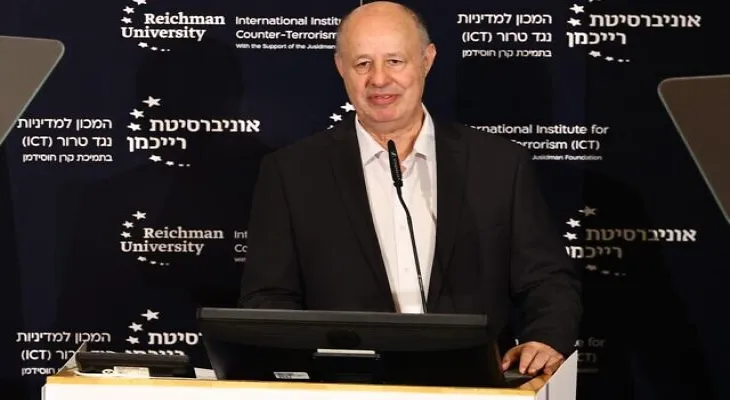Search here
Newspaper
Search here

Arab Canada News
News

Published: September 11, 2023
Israeli National Security Adviser Tzachi Hanegbi confirmed on Monday that he has been in regular contact with Palestinian officials since taking office, and that Prime Minister Benjamin Netanyahu's government is open to making significant concessions to Ramallah as part of the Saudi normalization deal.
Hanegbi said in a rare acknowledgment of the close contact between the two sides, “I have been conducting a dialogue with them on behalf of the Prime Minister for the past eight months.”
Speaking on the second day of the annual conference of the Institute for Counter-Terrorism at Reichman University in Herzliya, Hanegbi stated that the talks are occurring as part of a five-party dialogue with Jordan, Egypt, and the United States, with the parties having met in Aqaba and Sharm El-Sheikh earlier this year.
He added, “We are trying to reach agreements on security matters, so that they take responsibility for issues that touch their lives, the area, or so that the Israeli army does not have to enter the refugee camps in Jenin and Nablus instead of them.”
In July, the Israeli army launched a major two-day operation in Jenin against the local branch of the Islamic Jihad movement and smaller armed groups.
Hanegbi confirmed that senior officials on both sides are speaking “openly about what they want to gain from the other side,” noting that the talks have begun to bear fruit, including that Arab countries are “actively interested in the success of the talks.” Considering the prospects of reaching an agreement with Riyadh, Hanegbi stated, “It is important that the Palestinians are part of the process.”
Israel is likely to be asked to make significant concessions to the Palestinians that would bolster a two-state solution, a pill that would be difficult for Netanyahu's hardline government to swallow. Hanegbi said, “I believe there is a change in the Palestinian approach; they are very active. They are speaking with the Americans, they are speaking with the Saudis, and they are speaking with us about what the 'important Palestinian element' could be in the agreement.”
He continued, saying that Netanyahu's government is willing to make significant concessions to the Palestinians, but cannot accept any measures that jeopardize Israel's security.
Speaking after Hanegbi's remarks at the conference, National Unity Party leader Benny Gantz also addressed the concessions made to the Palestinians, stating, “I would advise all of us to wait and see the proposed deal, and only then express an opinion on whether these are concessions or rather steps that preserve the security and national needs of the State of Israel.”
Opposition figures have also criticized how Netanyahu's government is handling the sensitive diplomacy surrounding the Saudi deal.
Gantz, a partner in Netanyahu's previous government, stated, “The process worries me. The fact that Israel has shifted from being a partner to a spectator, and the fact that there are extremist elements in our government that could sabotage the agreement.”
At the same time, he pledged that his party would support an agreement if it appears to be in Israel's interest.
Speaking about the ongoing talks between the United States and the Saudis regarding a normalization agreement with Israel and a long-term security agreement between Washington and Riyadh, Gantz described it as “a great opportunity to mitigate terrorism.”
He continued, “It could be at the forefront of the regional structure that we have already started to build – against the Iranian axis as well. An agreement that strengthens moderate forces in the areas and weakens terrorist elements in the West Bank, Gaza, and Lebanon is a good agreement for Israel.”
Hanegbi also appeared cautious but optimistic about the process, stating that the talks are slowly transforming into “the outlines of an agreement.”
He said, “There is no longer a shot in the dark, but discussions about practical goals, where all parties define winning for themselves.”
Touching on the recently announced plan supported by the United States to build a railway and shipping corridor linking India with the Middle East, Israel, and Europe, Hanegbi said that talks regarding the ambitious plan between Israel and its partners in Europe and the United States are ongoing daily, adding, “We didn't talk about it because it wasn't clear it would materialize.”
U.S. National Security Adviser Jake Sullivan stated on Saturday that the transportation project is not viewed as a “precursor” to a potential normalization agreement, but he described Israel's inclusion as “important.”
Hanegbi noted, “Without Israel, there is no capacity to translate this entire story into actions, because they have to go through the Port of Haifa.”
“I cannot say what this project means for the future, but at the moment that Saudi Crown Prince Mohammed bin Salman signs a document mentioning Israel, stating that this entire story will be implemented through Israel, I assume that this means we need to examine this deeply,” he added.
Meanwhile, Hanegbi stated that Israel can only observe as an interested spectator while the Saudis and Americans try to reach an agreement between them, without which a normalization deal is unlikely to be reached soon.
Comments